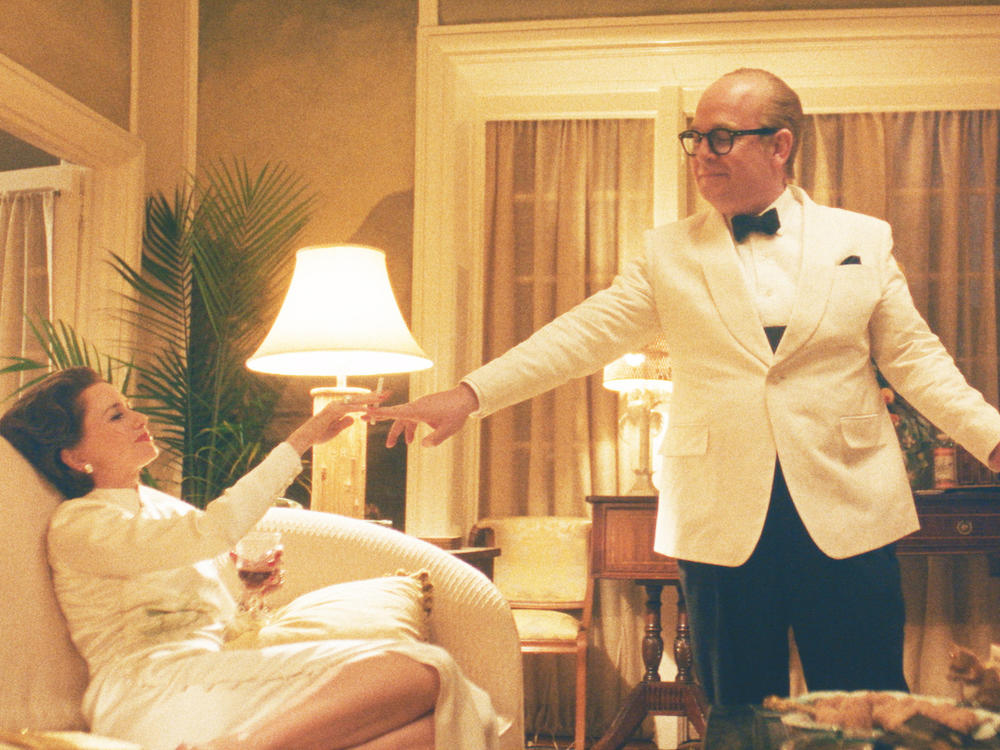Section Branding
Header Content
Don't miss the latest 'Feud' – between Truman Capote and NYC's society ladies
Primary Content
In 2017, the FX network presented the first edition of Ryan Murphy's Feud, an anthology series dramatizing infamous real-life conflicts. The inaugural edition was called Feud: Bette and Joan, and detailed the intense rivalry between Hollywood stars Bette Davis and Joan Crawford. Now, seven years later, the second installment of Feud finally has arrived.
FX is promoting Feud: Capote vs. the Swans as "the original Real Housewives," but it's a lot deeper than that — and infinitely more watchable. Based on the book Capote's Women, by Laurence Leamer, this eight-part series tells of Truman Capote's friendships with, and betrayals of, New York's most prominent society women — the ladies who lunch.
Jon Robin Baitz, who created the ABC series Brothers & Sisters, developed and wrote this edition of Feud for television — and Gus Van Sant directed most episodes, with others directed by Jennifer Lynch and Max Winkler. However, it's the names in front of the camera, not behind, who demand most of the attention here. Tom Hollander, from the most recent season of The White Lotus, plays Capote — and captures him so that Capote is a character, not a caricature.
And the women playing the swans all get their turns to shine, in a cast list that's almost laughably talented and lengthy. Naomi Watts plays Babe Paley, the wife of CBS chairman Bill Paley. Calista Flockhart plays Lee Radziwill, the sister of Jackie Kennedy. Other socialites are played — rivetingly well — by Diane Lane, Chloë Sevigny, Demi Moore and Molly Ringwald. Treat Williams, who died last year, is featured in his final role, as Bill Paley.
Even Jessica Lange, who starred as Joan Crawford in the previous Feud series, and helped jump-start Murphy's TV empire by starring in the first few outings of his earliest anthology series, American Horror Story, is here. She makes a few guest appearances playing Truman's late mother — and she's haunting, in more ways than one.
Feud: Capote vs. the Swans jumps around in time, showing the characters before and after Esquire magazine published a chapter of Capote's in-progress book in 1975. It was a thinly veiled exposé of the preening, privileged women he called "the Swans" — and it hurt them deeply. But drama and pain were not new to most of these women.
The first Feud miniseries veered at times into camp, but Capote vs. the Swans takes its story more seriously. It's got the loving details of a Downton Abbey or an Upstairs, Downstairs — lots of lingering shots of the food and the fashion and the jewels — but this drama is almost exclusively upstairs. And Baitz and Van Sant, in particular, frame things beautifully.
Capote's famous Black and White masquerade ball, in 1966, is the subject of the entire third episode — and it's shot, almost completely, in black and white. That's because the Maysles brothers were filming a documentary about Capote that same year, which allows Feud to adopt that perspective to interview some of the Swans about their literary acquaintance.
Capote vs. the Swans deserves our attention. It's a good drama, a compelling story with a powerhouse cast — and in this new installment of Feud, they all do some very powerful work.
Copyright 2024 Fresh Air. To see more, visit Fresh Air.

